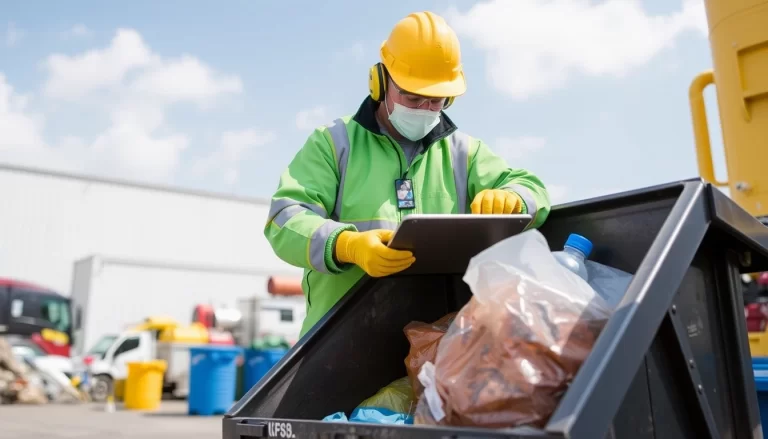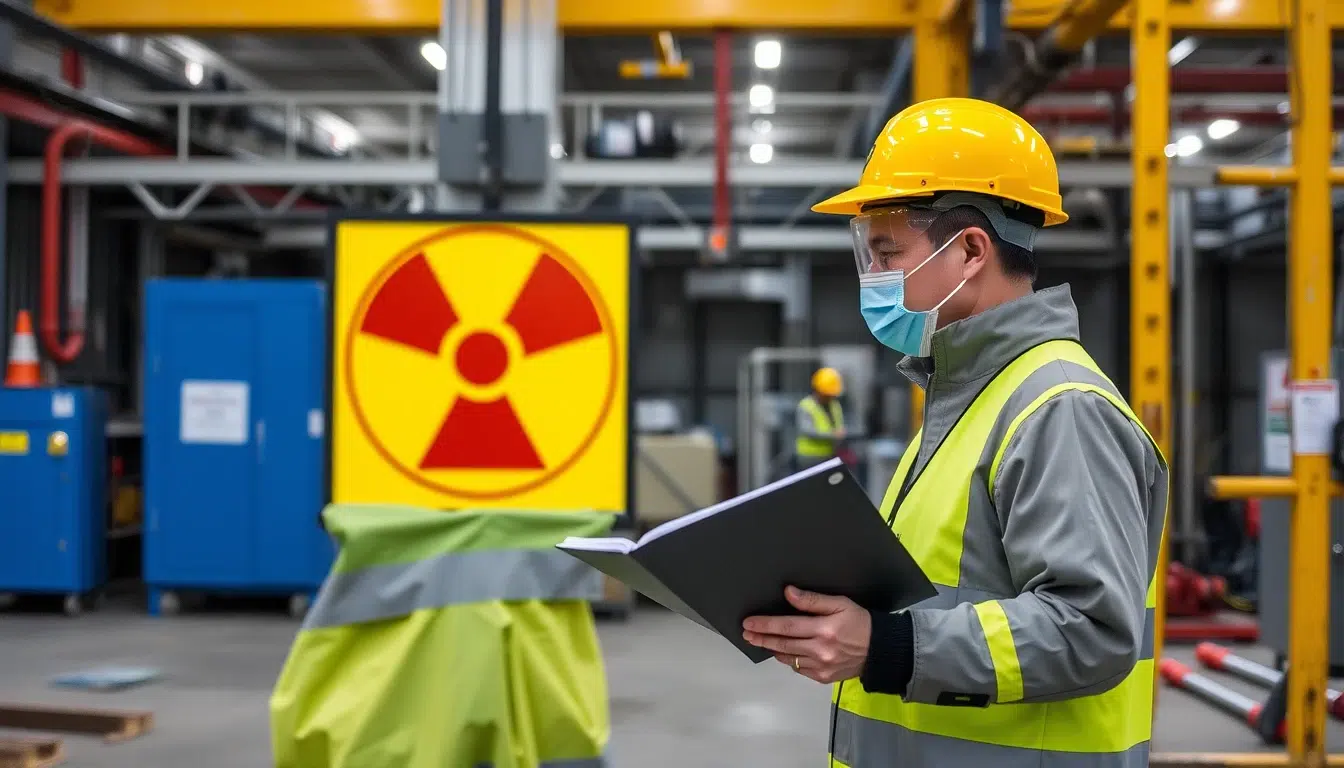Hazardous Waste Management and Disposal Training Course

| Date | Format | Duration | Fees (USD) | Register |
|---|---|---|---|---|
| 19 Jan - 23 Jan, 2026 | Live Online | 5 Days | $3785 | Register → |
| 09 Mar - 13 Mar, 2026 | Live Online | 5 Days | $3785 | Register → |
| 06 Apr - 10 Apr, 2026 | Live Online | 5 Days | $3785 | Register → |
| 18 May - 29 May, 2026 | Live Online | 10 Days | $7735 | Register → |
| 29 Jun - 01 Jul, 2026 | Live Online | 3 Days | $2625 | Register → |
| 28 Sep - 06 Oct, 2026 | Live Online | 7 Days | $5075 | Register → |
| 26 Oct - 30 Oct, 2026 | Live Online | 5 Days | $3785 | Register → |
| 14 Dec - 18 Dec, 2026 | Live Online | 5 Days | $3785 | Register → |
| Date | Venue | Duration | Fees (USD) | Register |
|---|---|---|---|---|
| 12 Jan - 14 Jan, 2026 | Munich | 3 Days | $5075 | Register → |
| 09 Feb - 20 Feb, 2026 | Dubai | 10 Days | $11085 | Register → |
| 09 Mar - 13 Mar, 2026 | Kuala Lumpur | 5 Days | $5575 | Register → |
| 13 Apr - 15 Apr, 2026 | Amsterdam | 3 Days | $5075 | Register → |
| 04 May - 08 May, 2026 | Los Angeles | 5 Days | $6835 | Register → |
| 08 Jun - 12 Jun, 2026 | Nairobi | 5 Days | $5775 | Register → |
| 19 Oct - 30 Oct, 2026 | London | 10 Days | $11615 | Register → |
| 23 Nov - 27 Nov, 2026 | Nairobi | 5 Days | $5775 | Register → |
| 07 Dec - 25 Dec, 2026 | Manchester | 15 Days | $14200 | Register → |
Did you know that effective hazardous waste management training can significantly enhance organisational safety and compliance, with research showing that proper training leads to improved waste handling practices, reduced incidents, and better regulatory adherence?
Course Overview
The Hazardous Waste Management and Disposal Training Course by Alpha Learning Centre is meticulously designed to equip professionals with essential skills in advanced waste management techniques, regulatory compliance, and safe handling practices. This course focuses on how professionals can effectively master advanced techniques for managing hazardous waste, enhance understanding of regulatory compliance, and develop skills in waste characterisation and risk assessment to ensure comprehensive operational excellence in modern waste management environments.
Why Select This Training Course?
Selecting this Hazardous Waste Management and Disposal Training Course offers numerous advantages for professionals involved in environmental health and safety, waste management, and regulatory compliance. Participants will gain advanced knowledge of waste characterisation, treatment technologies, and emergency response planning. The course provides hands-on experience with waste management simulations and real-world case studies, enabling attendees to optimise their hazardous waste management strategies effectively.
For organisations, investing in this training enhances overall operational safety and ensures better alignment with regulatory requirements. Research indicates that implementing comprehensive hazardous waste management training results in enhanced ability to prevent incidents, improve compliance, and reduce environmental impact. According to a study published in the Journal of Environmental and Public Health, proper training in hazardous waste management is crucial for minimising risks to human health and the environment.
For individuals who complete this course, there are significant career benefits. This training enhances professional profiles by providing expertise in hazardous waste management, which is highly valued by employers in various industries. Studies show that professionals who master hazardous waste management develop valuable skills that enhance their career prospects and effectiveness. As noted by GetBioMed, well-trained staff are better equipped to handle hazardous waste safely, reducing the risk of accidents and ensuring compliance with regulations.
Transform your hazardous waste management capabilities – Register now for this critical advanced training programme!
Who Should Attend?
- Environmental health and safety managers
- Waste management coordinators
- Compliance officers dealing with waste regulations
- Facility managers overseeing waste operations
- Engineers involved in waste processing and disposal
What are the Training Goals?
- Master advanced techniques for managing hazardous waste
- Enhance understanding of regulatory compliance in waste management
- Develop skills in waste characterisation and risk assessment
- Improve strategies for safe waste handling, treatment, and disposal
- Strengthen capabilities in emergency response for waste incidents
How will this Training Course be Presented?
Prepare for an immersive journey into the world of hazardous waste management! Our Hazardous Waste Management and Disposal Training Course delivers a dynamic and engaging learning experience through cutting-edge methodologies. This course is designed to challenge your perspectives, enhance your strategic thinking, and equip you with the skills necessary to excel in today’s complex waste management environment.
The course will be delivered through:
- Case studies on hazardous waste management failures and successes
- Workshops on waste stream analysis and treatment methodologies
- Expert discussions on current regulatory frameworks
- Simulations of waste spill and emergency scenarios
- Interactive sessions on developing waste management programmes
Each delivery method is carefully integrated to ensure participants gain both theoretical knowledge and practical experience. The course structure promotes active engagement and real-world application, allowing participants to develop crucial analytical and strategic skills within a supportive learning environment.
Prepare to be challenged, inspired, and transformed. Join us for an unparalleled learning experience that will redefine your approach to hazardous waste management!
Course Syllabus
Module 1: Hazardous Waste Characterization
- Advanced techniques for waste classification
- Chemical, physical, and biological waste analysis
- Determining waste’s potential for harm
- Use of technology in waste profiling
- Managing mixed waste streams
- Interactions between different waste types
- Documentation for waste characterisation
Module 2: Regulatory Compliance in Waste Management
- Navigating complex waste regulations
- Compliance with RCRA, CERCLA, and international standards
- Permitting requirements for hazardous waste facilities
- Reporting obligations and record-keeping
- Enforcement actions and penalties for non-compliance
- Regulatory audits and how to prepare for them
- Updates and changes in waste legislation
Module 3: Waste Minimization Strategies
- Techniques for reducing waste at the source
- Recycling and reclamation of hazardous materials
- Process optimisation to minimise waste generation
- Life cycle analysis for waste management
- Incentives for waste reduction programs
- Measuring success in waste minimisation efforts
- Integrating waste minimisation into business practices
Module 4: Safe Handling and Storage
- Best practices for handling hazardous waste
- Storage considerations for different waste types
- Preventing accidents during waste handling
- Compatibility issues in waste storage
- Secondary containment systems and spill prevention
- Safety protocols for waste storage facilities
- Training for waste handling personnel
Module 5: Treatment Technologies for Hazardous Waste
- Physical, chemical, and biological treatment methods
- Selection criteria for waste treatment technologies
- Innovations in waste treatment and neutralisation
- On-site vs. off-site treatment considerations
- Managing by-products of waste treatment
- Performance evaluation of treatment processes
- Compliance with treatment standards
Module 6: Disposal Methods and Criteria
- Landfill design for hazardous waste
- Deep well injection and its implications
- Incineration and controlled thermal destruction
- Land treatment and bioremediation approaches
- Criteria for selecting disposal methods
- Long-term liability of waste disposal sites
- Monitoring post-disposal environmental impact
Module 7: Emergency Response Planning for Waste Incidents
- Developing waste-specific emergency response plans
- Training for emergency response teams
- Coordination with external emergency services
- Equipment and resources for spill response
- Communication during a waste-related emergency
- Post-incident analysis and learning
- Updating emergency plans based on incident outcomes
Module 8: Transport and Shipping of Hazardous Waste
- Compliance with transport regulations (e.g., DOT, IMDG)
- Packaging and labelling for hazardous waste transport
- Manifesting and tracking waste shipments
- Risk assessment for waste transportation
- Managing international waste shipments
- Emergency procedures during waste transport
- Liability and insurance considerations
Module 9: Waste Management Performance Metrics
- Key performance indicators for waste management
- Benchmarking against industry standards
- Continuous improvement in waste management practices
- Cost analysis of waste management programs
- Environmental impact assessments
- Reporting waste management performance to stakeholders
- Incentive systems for waste management goals
Module 10: Ethical Considerations in Waste Management
- Ethical decision-making in waste disposal choices
- Transparency in waste management practices
- Community relations and public perception
- Balancing economic, environmental, and social responsibilities
- Ethical sourcing and end-of-life product management
- Training for ethical conduct in waste management
- Managing conflicts of interest in waste decisions
Module 11: Technological Innovations in Waste Management
- Use of AI and IoT in waste monitoring
- Remote sensing and GIS for waste site management
- Automation in waste sorting and treatment
- Blockchain for waste tracking and transparency
- Innovations in waste-to-energy conversion
- Cybersecurity in Waste Management Systems
- Evaluating new tech for waste management applications
Module 12: Contractor Oversight in Waste Management
- Selecting and managing waste management contractors
- Ensuring contractor compliance with safety and regulations
- Performance monitoring of waste contractors
- Contractual obligations for waste handling
- Training and coordination with waste contractors
- Joint emergency planning with contractors
- Legal and liability considerations with third-party waste management
Training Impact
The impact of hazardous waste management training extends beyond immediate efficiency gains to create long-term value for organisations. Research indicates that effective training in hazardous waste management leads to numerous benefits including improved safety outcomes, reduced environmental incidents, and increased regulatory compliance. According to GetBioMed, proper training ensures that staff are aware of the risks associated with hazardous waste, understand the correct procedures for handling and disposal, and are prepared to respond effectively to emergencies. This leads to a safer work environment, reduced risk of accidents, and better protection of public health and the environment.
These improvements translate to the following tangible benefits:
- Enhanced operational safety through proper waste handling and disposal practices
- Reduced incidents and associated costs related to hazardous waste mismanagement
- Improved compliance with complex waste management regulations
- Increased environmental protection and corporate social responsibility
By investing in this advanced training, organisations can expect to see:
- Significant improvement in hazardous waste management effectiveness
- Improved ability to handle complex waste-related challenges
- Enhanced decision-making capabilities through comprehensive waste management knowledge
- Increased competitiveness through optimised waste management strategies
Transform your career and organisational performance – Enrol now to master Hazardous Waste Management and Disposal!
FAQs
4 simple ways to register with Alpha Learning Centre (ALC):
Website:
Log on to our website www.alphalearningcentre.com. Select the course you want from the list of categories or filter through the calendar options. Click the “Register” button in the filtered results or the “Manual Registration” option on the course page. Complete the form and click submit. Telephone:
Call +971 58 102 8628 or +44 7443 559 344 to register. E-mail Us:
Send your details to [email protected]. Mobile/WhatsApp:
You can call or message us on WhatsApp at +971 58 102 8628. Believe us; we are quick to respond to.
Yes, besides English, we do deliver courses in 17 different languages which includes Arabic, French, Portuguese, Spanish—to name a few.
Our course consultants on most subjects can cover about 3 to maximum 4 modules in a classroom training format. In a live online training format, we can only cover 2 to maximum 3 modules in a day.
Our public courses generally start around 9:30am and end by 4:30pm. There are 7 contact hours per day.
Our live online courses start around 9:30am and finish by 12:30pm. There are 3 contact hours per day. The course coordinator will confirm the Timezone during course confirmation.
A valid ALC ‘Certificate of Training’ will be awarded to each participant upon successfully completing the course. Accredited certificates from HRCI, PMI, CPD, IIBA are also available upon request and additional fees.








